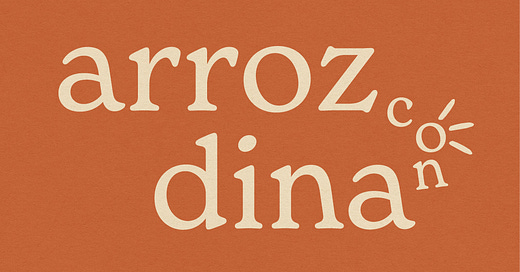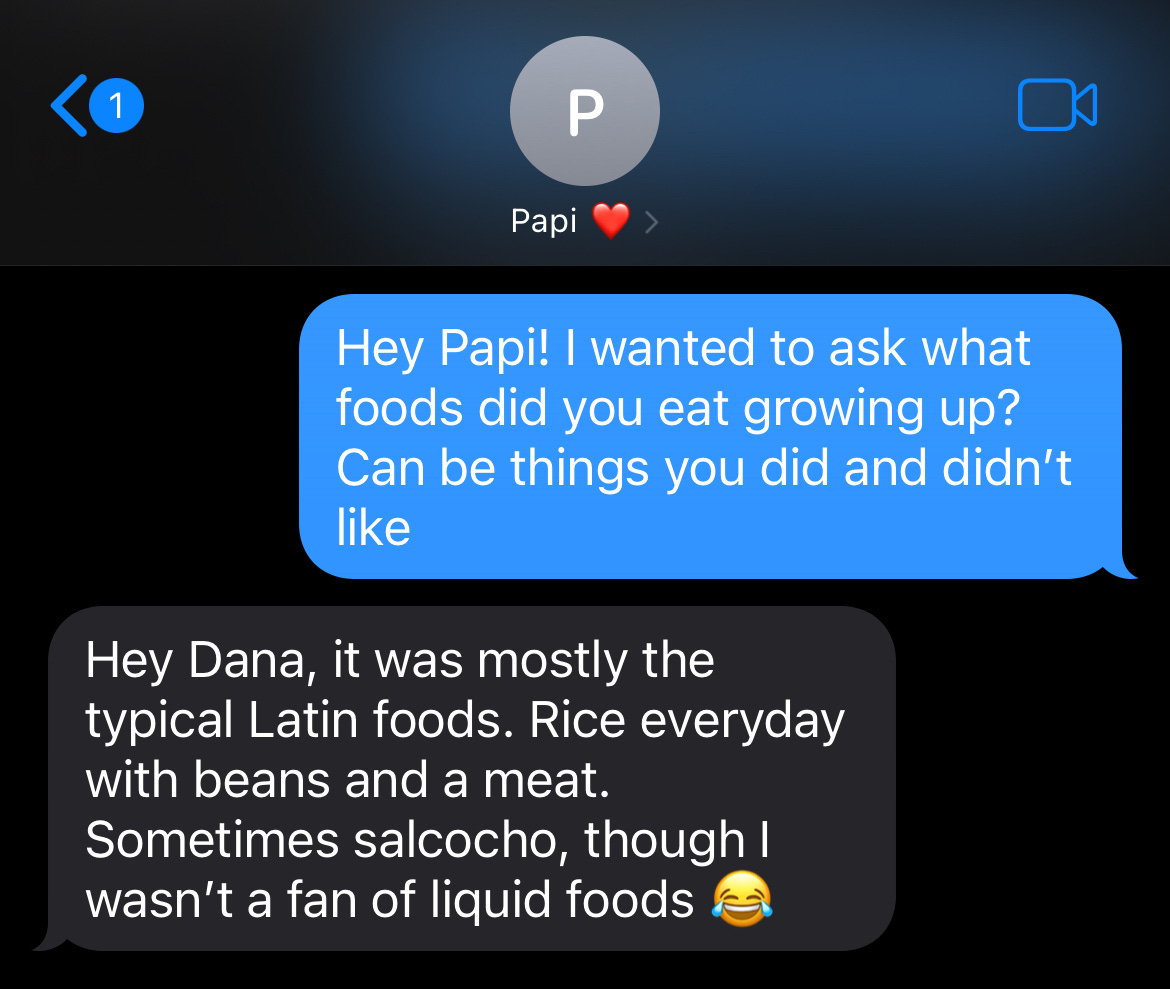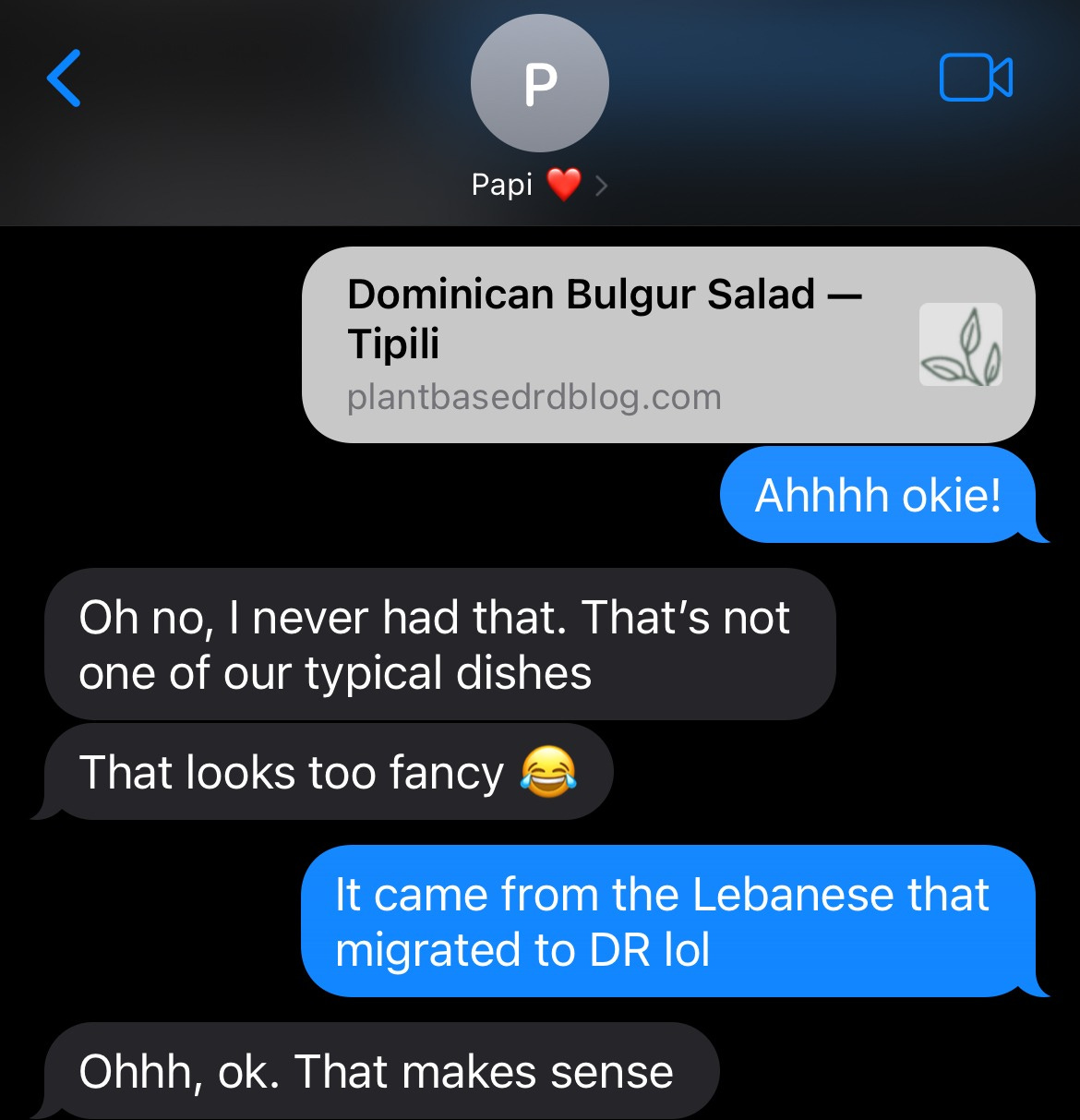I tend to write about my musings on life, overall self-reflection or self-awareness, and all things food in Puerto Rico. This time it’s a little different! I was watching an Instagram reel, posted by a chef I follow in the Dominican Republic, Alberto Morel. He posted a video on Tipili or Tipile, and I was instantly reminded of Tabbouleh; with roots in Lebanon and Syria. I didn’t grow up eating Dominican food because my father wasn’t much of a cook. Aside from the food I’d get in the cafeterías or restaurants around New York City. Although, Puerto Rico and the Dominican Republic have lots of overlap food-wise. I would say aside from some differences in seasoning and cooking methods like using sugar to brown meat, our food is incredibly similar. However, my father did teach me how to make mangú. We used to have parties out of it! Caribbeans can make a party out of nothing. Many of my family would come over and we’d drink and eat, it was the best.
So I am by no means writing from a positionality of authority, only curiosity. My step-father, whom I call Papi—it feels weird to refer to him as my step-father since he raised me—was born and raised “en la capital” of the Dominican Republic, Santo Domingo; his family originally from Puerto Plata. He migrated to the United States when he was twenty-five years old. He has a funny story of him using a toilet for the first time that he loves to tell people. I think he does it because it reminds him of home, even though his relationship with “home” is quite complicated and laden with grief. It feels fitting to write about him and Tipili, because his birthday was on Saturday—58 years young or 29 in his head. We should all ask our parents more about their childhood, it might be complicated and it’s easy to remember the hard moments more so than the good ones, but they do have them even if they are few. It’s important to remember their stories and the lives they had before becoming our parents.
When my parents were together, my father would often tease my mother when she would make soup for dinner. Often sopa boba or sopa de salchichon with arañitas, asopao de camarones (shrimp), or gandules (pigeon peas) with balls of guineo (green bananas) boiled in the broth. He would say things like “I’m hungry, not thirsty.” Hence the laughter when referring to liquid foods. I would say though sancocho is barely a liquid food due to how much one puts in a sancocho. I think Dominicans take the cake when it comes to sancocho, even though I will gladly eat both preparations from PR and DR. I asked him about Tipili though and he told me he had no idea what I was talking about, most likely due to my father’s poor upbringing, trigo, and parsley probably were not items he came across very often. Interestingly enough, one of my close friends’ sister posted a photo of her batch of Tipili and said it was called Tipile due to Dominicans not knowing how to say Tabbouleh, however, similar to the folklore of the soldier saying “man, that’s good!” and thus birthed “mangú” one cannot know if that is the true reason for Tipile or Tipili. My friend’s last name is Manzur, similar to the Arabic origin of Mansour, pronounced the same too, and while he is Dominican, his father’s family migrated from Lebanon to the Dominican Republic which makes sense for him and his sister to have grown up eating Tipili versus someone like my father.
Tipili also has roots in Palestine and Egypt, and in the late 19th Century along with those from Lebanon and Syria, migrated to the Dominican Republic, introducing bulgar wheat (trigo). Another Dominican food that uses bulgar wheat is Quipe, similar to Kibbeh in the Middle East and alcapurrias in Puerto Rico—even though root veggies are used versus trigo, the method of wrapping meat in a dough of sorts is similar. The overlap between Levantine cuisine and the Caribbean is truly fascinating, even in language! Spanish and Arabic have incredible similarities linguistically, and I always think of this one video I watched a few years ago, demonstrating the similarity and briefly explaining the reason being because of The Moors in Spain. This influenced Spanish cuisine immensely, and we know Spain, through colonization, impacted Caribbean cuisine. I know many people use the word “influence,” but I often wonder what our food would have looked like if not for the lasting impacts of colonization.
While I don’t have a recipe for Tipile, one can refer to the video I shared and try it for yourself. I know I will and probably even share it with my father the next time I see him, given he has never had it before. He might say it’s “too fancy,” as he would always refer to my mangú, based on the presentation, or a poached egg in place of a fried egg—sometimes you want to be health conscious—let a girl rock. Although my father says, “That’s not one of our typical dishes,” he might be right, but I also consider how food is personal to each family and based on religious and cultural differences, what isn’t typical to yours might be for another family. While he may not have grown up eating it, someone else has, and that is the beauty of our food. It’s personal and not “too fancy.”
If you make it or have had it, I would love to know!





